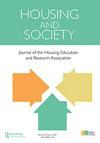Youth who sleep in motels: an acknowledged but unknown population of the hidden homeless
Q2 Social Sciences
引用次数: 1
Abstract
ABSTRACT There is not one unifying definition of youth homelessness in the U.S. Rather, youth who are homeless are included in three separate definitions. Youth who sleep in motels are included in these definitions depending on whether they are in school, their age, and how long they are able to stay. Motel residents are not counted in the annual Point in Time counts in most cities and are excluded from literature on youth who are homeless, leaving a dearth of information on their experiences. In addition, little is known about the needs of motel youth and how they might differ from youth staying in other temporary accommodations, especially those recognized by HUD. This paper takes a first step to assess if youth who experience homelessness in motels vary in any major ways from youth who reported a different sleeping location on the previous night in a 2015 survey of Atlanta homeless youth. Findings show statistically significant relationships between one’s sleeping location and income, substance use, contact with homeless service providers, and age. The results imply that there might be important differences between youth who reside in motels and those who reside in other locations while homeless.睡在汽车旅馆的年轻人:一个公认但不为人知的隐藏无家可归者群体
摘要在美国,青年无家可归并没有一个统一的定义。相反,无家可归的青年被分为三个单独的定义。睡在汽车旅馆的年轻人被包括在这些定义中,这取决于他们是否在学校、年龄以及他们能呆多久。在大多数城市,汽车旅馆的居民不计入年度时间点统计,也被排除在关于无家可归青年的文献之外,因此缺乏关于他们经历的信息。此外,人们对汽车旅馆青年的需求以及他们与住在其他临时住所的青年的不同之处知之甚少,尤其是那些得到住房和城市发展部认可的青年。这篇论文迈出了第一步,评估在汽车旅馆无家可归的年轻人与2015年对亚特兰大无家可归青年的调查中报告前一天晚上睡在不同地方的年轻人是否有任何重大差异。研究结果显示,一个人的睡眠地点与收入、药物使用、与无家可归者服务提供者的接触以及年龄之间存在统计学上的显著关系。研究结果表明,住在汽车旅馆的年轻人和无家可归时住在其他地方的年轻人之间可能存在重要差异。
本文章由计算机程序翻译,如有差异,请以英文原文为准。
求助全文
约1分钟内获得全文
求助全文
来源期刊

Housing and Society
Social Sciences-Urban Studies
CiteScore
2.30
自引率
0.00%
发文量
10
期刊介绍:
Housing and Society is the journal of the Housing Education and Research Association (HERA). The journal supports the mission of HERA by providing for the dissemination of research and other scholarly work. Submissions from a broad range of perspectives are encouraged. Topics in housing include: policy, design, social aspects, gerontology, behavioral aspects, energy/environment, equipment, interiors, economics, theory/model development, education, and program development or evaluation. The journal welcomes the submission of original research articles, notes and commentaries. Notes are shorter manuscripts presenting succinct information on housing related to one of the following categories: - Research: exploratory or not heavily theory-based or statistically analyzed - Academic: innovative teaching ideas - Program: development, implementation, and/or evaluation of Cooperative Extension or other housing programming efforts - Policy: examination of policy impact, comparative analysis, and/or need to achieve housing goals - Reviews: books, documentaries, etc.
 求助内容:
求助内容: 应助结果提醒方式:
应助结果提醒方式:


